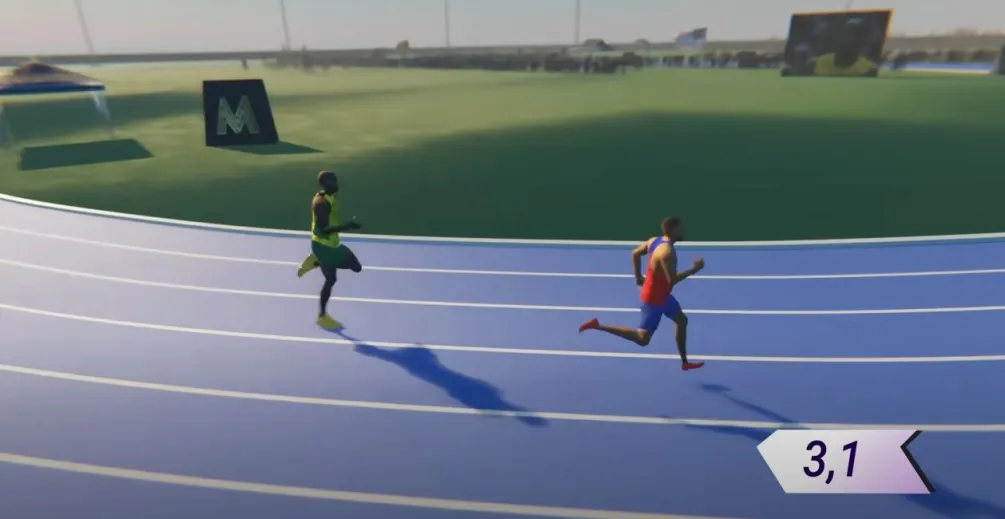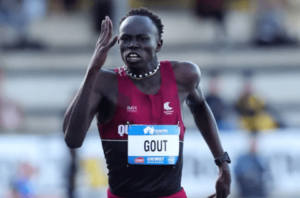
3D simulation shows how 100m and 200m race between Usain Bolt and Noah Lyles would go…
A **100m and 200m race between Usain Bolt and Noah Lyles** would be an exciting clash between two of the fastest sprinters in the world. While they have competed in the same era, they have never faced each other at their respective peaks. However, using **3D simulation technology**, we can estimate how such a race would play out based on their past performances, athletic capabilities, and running styles.
### Usain Bolt’s Legacy
Usain Bolt is widely considered the greatest sprinter of all time. With world records in both the 100m (9.58 seconds) and 200m (19.19 seconds), Bolt’s achievements are unparalleled. He won multiple Olympic and World Championship gold medals, and his signature long strides, combined with his 6’5″ frame, make him uniquely suited for both the 100m and 200m events. Bolt’s acceleration and ability to maintain top speed over the final 40 meters of the 100m race is where he sets himself apart from others.
### Noah Lyles’ Rise to Prominence
Noah Lyles is a modern star in sprinting, particularly excelling in the 200m. Lyles won the **200m gold medal** at the **2019 World Championships** and ran his personal best of **19.31 seconds** in 2022, making him one of the fastest 200m runners in history. While Lyles doesn’t hold the world record, his consistency and technique are unmatched in recent years. His compact frame and explosive acceleration make him particularly dangerous in the 200m. Although Lyles competes in the 100m, his true specialty is the 200m.
### Simulating the 100m Race
In a 100m race, Usain Bolt would have a clear advantage. Bolt’s best time of **9.58 seconds** is not just the world record but also a showcase of his superior top-end speed and mechanics. During the first 30 meters, Bolt tends to start slower compared to many of his competitors, including Lyles, but his long stride and powerful drive phase make up for this initial deficit. Noah Lyles, on the other hand, is an explosive starter. His acceleration off the blocks is impressive, and for the first 50 meters, he could keep pace with Bolt.
In a **3D simulation**, Lyles would likely be ahead for the first 30 to 40 meters of the race, as Bolt takes longer to reach his maximum speed. However, by the **50-meter mark**, Bolt’s towering stride length and efficiency would start to take over. From here to the finish, Bolt’s speed endurance would kick in, allowing him to maintain his top speed better than Lyles.
Bolt’s **9.58-second** mark would likely still be too much for Lyles to overcome. Noah Lyles’ **personal best of 9.86 seconds** means that while he’s incredibly fast, Bolt’s unique combination of top speed and stride length would see him edge ahead in the final meters. In a simulated 100m race, Bolt would win by **around 0.3 to 0.4 seconds**, finishing in 9.58 seconds, with Lyles crossing the line at 9.86.
### Simulating the 200m Race
The 200m would be a much closer contest. Bolt’s world record of **19.19 seconds** is still faster than Lyles’ personal best of **19.31 seconds**, but Lyles has shown remarkable consistency in the 200m, winning gold at major championships and setting impressive times. Lyles’ natural ability over this distance is his strongest asset, and he could pose a serious challenge to Bolt.
In the **first 100 meters**, Lyles would likely take the lead. Bolt’s longer acceleration phase would once again play a role, and Lyles’ explosive start could give him an early edge. Both runners would reach maximum speed by the 100-meter mark, with Lyles slightly ahead.
As they round the bend into the straight, the difference in their running styles would become more apparent. Lyles’ **turning technique** is widely regarded as one of the best in the world. His ability to maintain speed while navigating the curve is exceptional, and this is where he could potentially extend his lead. However, Bolt’s sheer power would make him difficult to hold off.
Over the final **80 meters**, the race would become a battle of speed endurance. Bolt’s ability to maintain his top speed for longer periods, even when fatigued, would begin to show. Despite Lyles’ impressive turning speed and acceleration, Bolt’s long strides would gradually close the gap in the final stretch.
In a **3D simulation**, Bolt would likely win by a narrow margin. Bolt’s finishing time of **19.19 seconds** still remains out of reach for Lyles, whose personal best stands at 19.31 seconds. Lyles would likely finish around **19.40 seconds** in this hypothetical race. The simulation would show Bolt gradually overtaking Lyles in the final 30 meters of the race, crossing the finish line about **0.2 seconds** ahead.
A simulated race between **Usain Bolt and Noah Lyles** over both the **100m and 200m** would highlight their contrasting strengths. In the **100m**, Bolt’s superior top speed and stride length would see him defeat Lyles by a clear margin. The **200m race**, however, would be a much closer affair, with Lyles likely taking an early lead due to his explosive start and curve-running abilities, only for Bolt to pull ahead in the final stretch with his unmatched speed endurance.







